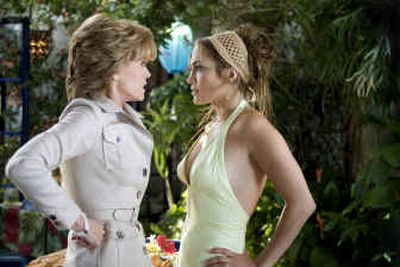J-Lo vs. J-Fo battle plays out a little bland

The possibility of watching Jennifer Lopez and Jane Fonda tear each other apart in “Monster-in-Law” inspires a certain morbid curiosity – something akin to Godzilla vs. Mothra, with bronzed skin and blond highlights.
By this point, J.Lo and J.Fo have created such larger-than-life personae that they are more than mere actresses: They’re multimedia empires, separated by a generation.
That’s part of the vague allure of “Monster-in-Law,” Fonda’s first film in 15 years. But it also begs the question: Why would she choose this project – which thrusts her into humiliating physical comedy – to mark her return to the screen?
She could have done anything. She has done everything – except play a true villain, which she gets to do as the movie’s titular terror. And while she truly seems to be giving it her all and does exude a certain radiance, the film from director Robert Luketic (“Legally Blonde”) and first-time screenwriter Anya Kochoff reduces her to two-dimensional, Joan Crawfordesque divadom.
Fonda plays Viola Fields, a high-powered, veteran news anchor patterned after Barbara Walters, who has a meltdown after she’s fired for being too old. But she emerges from psychiatric treatment with the comforting thought that she still has her son – her precious baby boy, Kevin (Michael Vartan) – who has managed to become a hot young surgeon despite Viola’s incessant smothering.
Then Kevin brings home his new girlfriend, Lopez’s Charlie, just as Viola is struggling to maintain even a tenuous grasp on her mental health and sobriety.
Once the too-good-to-be-true Kevin gets down on one knee and proposes marriage – in front of his mother, over tea and cake on the terrace – the cartoonish game of sabotage begins.
Charlie finally gets wise to Viola’s devious plan to derail her wedding, and the two women candidly confront each other, but the moment is more compelling in concept than execution. Waiting for what will happen when these two enormous creatures fill the screen provides a juicy setup for a bitter, one-joke letdown. And you know Viola will have a change of heart in the end, though realistically such an evolution seems totally impossible.
On Charlie’s wedding day, she and Viola literally come to blows, until the estimable Elaine Stritch arrives as Viola’s monster-in-law to give both women a beat-down and provide some grace and civility. By then, it’s too little too late.